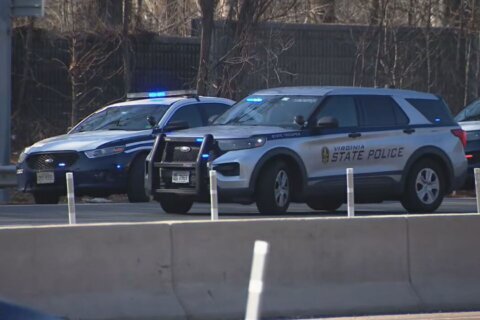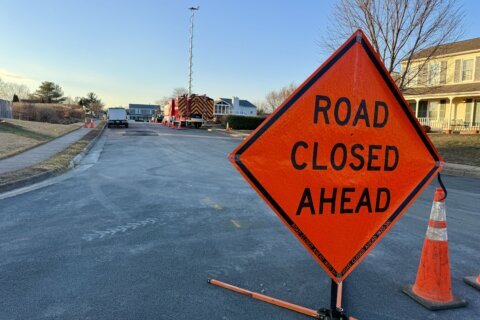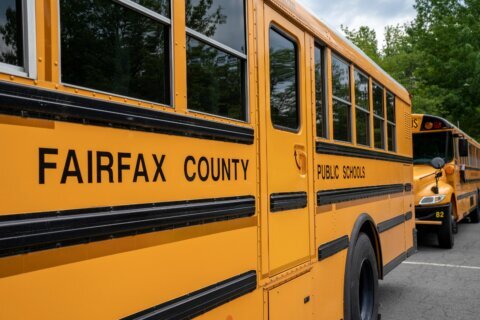This article was written by WTOP’s news partner InsideNoVa.com and republished with permission. Sign up for InsideNoVa.com’s free email subscription today.
This article was republished with permission from WTOP’s news partner InsideNoVa.com. Sign up for InsideNoVa.com’s free email subscription today.
Attorneys pleaded their cases before a U.S. District Court judge Monday in a case that could temporarily block SB 739 and allow for the return of mask mandates in select situations inside Virginia public schools.
Last month, the parents of 11 students with disabilities – including one Manassas City Public Schools student – asked a federal judge to grant a temporary injunction blocking the implementation of SB 739 and Gov. Glenn Youngkin’s Executive Order 2, which effectively ended schoolwide mask mandates as of March 1.
To do so, the parents are suing Youngkin and a number of other state officials but are not suing the local school divisions themselves. Before Monday’s hearing, the Fairfax County School Board submitted a brief in support of the plaintiffs, calling the state law unconstitutional.
On Monday afternoon, Judge Norman Moon from the U.S. District Court for Western Virginia heard oral arguments in the case, saying he’d try to get a ruling out quickly. Representing the parents, Eve Hill told Judge Norman Moon that the plaintiffs’ case was not an attempt to restore universal mask mandates in Virginia public schools.
Hill said the new law – which was passed by the General Assembly in February – and Youngkin’s order violated the Americans with Disabilities Act, which mandates that schools make reasonable accommodations for students with disabilities to allow for a public education.
For students like Jack Nelson, a 10-year-old at Jennie Dean Elementary in Manassas with cystic fibrosis (a disease that can hinder breathing and make patients particularly susceptible to lung infections), that could mean an individualized plan requiring classmates to wear masks while in the same classroom or other mitigation strategies like social distancing, according to Hill.
“[Plaintiffs] are seeking to not be denied the reasonable modification of a mask requirement to the extent a student with a disability needs their peers to be masked in order to be safe at school. The mask requirement for any given student will vary,” Hill told the court Monday afternoon. “For Jack’s situation, only a single classroom will need to be masked because he remains in the same classroom with his peers all day – and only until COVID transmission rates in the district are low.”
A recent National Institutes of Health study found that more than 10 percent of cystic fibrosis patients require critical care within a month of a COVID diagnosis, but the study was conducted before the rollout of vaccines.
Hill said school divisions have had their hands tied by the new senate bill, which bars any kind of mandatory masking inside public schools. In turn, Jack and other students have had to stay home on the advice of their doctors, denying them the public education they’re entitled to by law. Their schools have either said they can’t implement an individualized masking plan or haven’t been responsive, according to Hill. MCPS declined to comment.
“The state has an obligation under the ADA to not exclude students with disabilities and to reasonably modify policies when necessary to allow students with disabilities access. SB739 and Executive Order 2 are state law, and if they conflict with federal law, they have to give way,” Hill said.
But Moon probed a number of Hill’s assertions, at one point asking if every school in the state with a student at high risk for severe illness from COVID-19 could mandate masks for their classmates. Hill replied that masking would only be required insofar as it was necessary to protect the student, like in their classroom.
Virginia Solicitor General Andrew Ferguson, arguing for the state, pushed back on a number of fronts. For starters, he said, both Youngkin and Attorney General Jason Miyares stand firmly in support of the rights of students with disabilities to access a public education. But, he told the court, the plaintiffs were suing the wrong party. If schools are being unresponsive or not implementing federally-mandated plans for students with disabilities, parents should take action against their local school divisions for violating the ADA.
He further argued that even with a ban on mandated masking in Virginia’s public schools, there were a number of other reasonable accommodations available to schools and parents to provide for the safety of their students.
“That can include vaccination, social distancing, improved insulation … the provision of high-quality masks to students with disabilities,” Ferguson said.
He also pointed to the changing federal guidance on COVID, including the recent change in Centers for Disease Control guidance that dropped the recommendation for indoor mask mandates in most of Virginia.
“Even the president at the State of the Union celebrated the end of universal masking in his speech,” he said.
Finally, Ferguson argued that an injunction in this case would cause hardship and confusion following the recent change in most school divisions to mask-optional policies, while likely still not winning the parents the recourse they were seeking with case rates falling rapidly across Virginia.
“I think it just beggars belief to argue that the school divisions would follow now the same policies they originally adopted a year ago. If, however, the court decides it has jurisdiction … then the question is whether forcibly masking the plaintiffs’ classmates universally and indefinitely is the only reasonable accommodation that could possibly satisfy the requirements of the ADA,” Ferguson said. “The answer to that question is no.”
Last month, an Arlington County Circuit Court judge granted seven school boards an injunction against Youngkin’s executive order on grounds that it contradicted a 2021 state law passed by the General Assembly. That ruling prompted majorities in both houses of the General Assembly to pass SB 739, doing away with all mask mandates in schools by March 1 and making the Arlington case obsolete.
Wrapping up on Monday, Moon told the parties that he’d try to get a decision out quickly.







